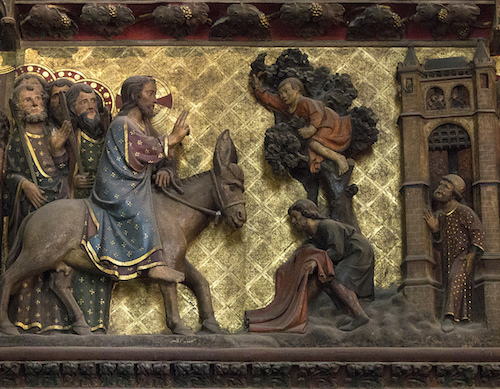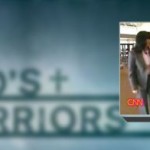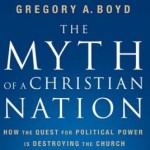We run our website the way we wished the whole internet worked: we provide high quality original content with no ads. We are funded solely by your direct support. Please consider supporting this project.

Palm Sunday, Partisan Politics & the Power of the Cross
Today we’re sharing something from David D. Flowers that we found especially insightful as we approach holy week. We hope it blesses you and moves you to more fully manifest the kingdom that is not of this world.
~~~
We remember it in the church as Palm Sunday. This is the triumphal entry of Jesus into Jerusalem. It’s the day when Jesus of Nazareth pre-planned a comical, yet prophetic event, in order to fulfill Zechariah’s prophecy of the coming Messiah (Zech 9:9).
Jesus literally acts it out.
It’s no coincidence. At the same time Pilate is parading in on the west side of the Temple to oversee Passover, ready to put a stop to any chaos that might ensue, Jesus decides to ride into Jerusalem on a donkey. He’s not on a war horse wielding a sword, he’s on a donkey. And he’s not packing.
Think about that.
Not quite the entrance folks were expecting from their Messiah.
Nevertheless, the crowds give him a royal welcome. They shouted, “Hosanna to the Son of David! Blessed is he who comes in the name of the Lord!”
And all of this to the waving of palm branches, symbolic of Messianic deliverance to the Jews, clearly harkening back to the time the Maccabees threw off Greek rule in Judea. Everyone understands this scene.
This is it. It’s Jesus’ time to prove himself as the long-awaited Messiah, the son of God. Will he go to the Antonio Fortress, where the largest garrison of soldiers are housed in Jerusalem, where Rome kept an eye on things? No doubt, the crowd could quickly turn into a mob and rush the place.
But he doesn’t take a right for the fortress, instead he goes left through the eastern gate, and into the Temple. He goes in, looks around, and according to Mark’s gospel, he leaves and returns the next day for some prophetic theater in the spirit of Jeremiah. We all know what happens next.
He wasn’t “cleansing” the Temple. He was shutting it down.
By the end of the week, Jesus had pretty much peeved everyone off. And early Friday morning Jesus is standing before Pilate saying:
“My Kingdom is not an earthly kingdom. If it were, my followers would fight to keep me from being handed over to the Jewish leaders. But my Kingdom is not of this world.” John 18:36 NLT
He said his kingdom is not of this world. Wait… what?
What does Jesus mean that his kingdom is not of this world?
Click here to read the rest of David’s thoughts.
Photo credit: Lawrence OP via Visual Hunt / CC BY-NC-ND
Category: General
Tags: David D. Flowers, Easter, Politics, Upside-Down Kingdom
Related Reading

God’s Warriors
Greg’s ideas on faith and politics were featured in the Peabody Award-winning CNN Presents: God’s Warriors. Watch the full video below. For more information, including behind the scenes footage, visit God’s Warriors – Special Reports from CNN.com.

The Issue that Unites Us
While there is a great deal of disagreement on political issues and while we can debate (endlessly) on political solutions, there is one thing that should always unite us despite all of this: our ultimate allegiance is not to a politician or a country, but to Jesus alone. One way of demonstrating this unity is…

One Hope
When Jesus was crucified by his enemies instead of conquering his enemies, the hope of Jesus’ disciples came crashing down in utter despair. They had hoped that Jesus would establish the kingdom of God in the same way that other kingdoms were established. However, the resurrection reveals that the kingdom of God is not like…

Part two of a three-part interview with Greg
David D. Flowers is doing a three part interview with Greg over on his blog. He posted the first of those interviews last week. The second interview was posted today. Check it out!

“I hope to challenge the assumption that finding the right political path has anything to do with advancing the kingdom of God.” [Quotes]
I do not argue that those political positions are either wrong or right. Nor do I argue that Christians shouldn’t be involved in politics. While people whose faith has been politicized may well interpret me along such lines, I assure you that this is not what I’m saying. The issue is far more fundamental than how we should vote or participate in government. Rather, I hope to challenge the assumption that finding the right political path has anything to do with advancing the kingdom of God.

Lighten Up: Election Season Blues
It’s a little sad (but still pretty funny) that there are actual campaign posters similar to this one. The next time you get fed up or discouraged with all the over-the-top election ads, you might want to browse through these for a chuckle. And remember that our hope is not located in any election. Thank…
